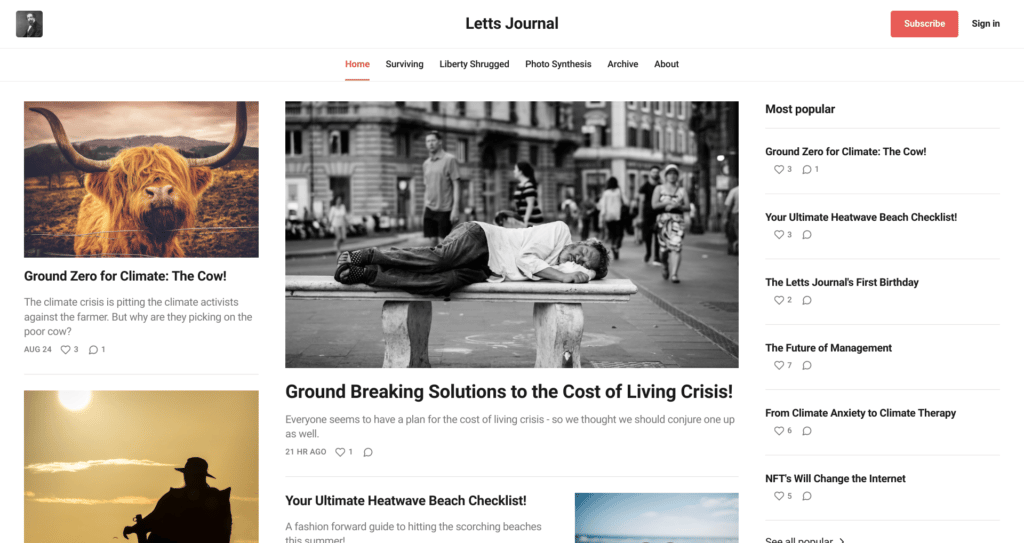
LettsGroup is revolutionising the venture model with advanced technology. Today, technology leadership is a huge determiner of economic and global dominance. LettsGroup is at the forefront, investing in deep tech and pioneering innovative solutions that will shape the future of society and economies.
Led by Philip Letts, the 7th generation of the Letts family and Executive Chair of LettsGroup, the company is equipped with a long-standing family legacy of innovation, and is now combining it with cutting-edge technology to create a systematic approach to venture production. They have two guiding principles and methods to achieve impact in venture building.
First, the Innov@te™ methodology uses a customer-centric approach. It places the customer at the heart of the innovation process. Through tight-loop systems of curation that involve data collection and behavioural analysis, LettsGroup ensures that its ventures are built to meet the needs and behaviours of the target audience, resulting in a higher chance of successful adoption of their products in the global market.
Second, their Size Zero methodology addresses the traditional notion that getting "too big" kills innovation. Instead, it focuses on efficiency and control in scaling ventures, providing a solid foundational structure for sustainable operations. The unique combination of methodologies allows LettsGroup to achieve repeat innovation and sustainable venture building, setting a new standard in the industry.
"LettsGroup is committed to pushing the boundaries of the venture model by leveraging advanced technology and deep tech investments," said Philip Letts, Chair of LettsGroup.
"In today's dynamic global landscape, technology leadership is a key determinant of economic and societal success. We are dedicated to investing in innovative solutions that will shape the future and drive ventures to the top of the global power rankings."
LettsGroup has already made significant strides with its initial ventures. LettsArt, the first NFT-enabled, fully accessible, website platform designed purely for the art world, has quickly gained traction, providing a new way for artists, art dealers and collectors to engage with and better monetize online audiences. LettsSafari, a subscription-based digital climate venture, has also gained momentum in addressing the biodiversity crisis through rewilding initiatives that are defining subscription economy eco-services. Additionally, LettsGroup is developing LettsNews, a fully automated, AI powered news network, and LettsCore, a groundbreaking Media-as-a-Service platform that is creating the first content blockchain.
As LettsGroup marks the 3rd iteration of Letts family incubators in 2023, it continues to redefine the venture model with its innovative approach, looking to drive ventures to develop industry-first practices. The company remains committed to its corporate values of innovation, sustainability, quality, integrity, and family, and aims to make a lasting impact in the world of venture building.
Subscription-based services are changing the game for ecommerce, media, and streaming industries. LettsGroup is paving the way, adopting subscription services for an array of its own ventures.
The evolution of technology has affected human behaviour and shifted business operations and competition accordingly.

Subscription models have seen consistent growth and pickup by businesses as large as Unilever and Walmart as well as many startups and small businesses.
Over the last decade, the subscription ecommerce market has experienced meteoric growth. According to Forbes, there’s been 890% expansion since 2014. Currently, there are 18.5 million subscription box shoppers in the U.S. and 35% of these active shoppers subscribe to three or more services, with a median number of subscriptions per active subscriber being two.
According to Hitwise, the average demographic of this consumer is a younger millennial with a college degree that lives in a college town with an income above $100,000 (£75,000). They are also often an Amazon shopper, a regular reader of online news and more likely to buy online than in-store.
There are three broad types of ecommerce subscriptions:
Replenishment subscriptions (32% of subscriptions) - which allow consumers to automate the purchase of commodity items, such as razors or diapers.
Curation subscriptions (55% of subscriptions) - that attempt to surprise and delight by providing new items or highly personalised experiences in categories such as apparel, beauty, and food.
Access subscriptions (13% of subscriptions) - pay a monthly fee to obtain lower prices or members-only perks, primarily in the apparel and food categories.
The future looks bright for the recurring revenue leaders.
More relevantly, subscription-based media is a major game-changer. With news media diving head-first into the digital world, ad revenues and circulation have been in decline, and an endless series of cost cutting and transformation plans has led to the industry stabilising around paid subscriptions. LettsGroup’s own The Letts Journal has been at the forefront of subscription-based systems, solely reliant on digital circulation with paywalled systems for revenue as an ad-free service. And, based on demographics alone, the internet paywall is becoming a key part of the future of profitable digital content circulation.
While newspaper staff numbers keep falling and print circulation declines, digital media is growing. Based on publicly traded companies, in 2020, ad revenue for digital newspapers stood at 39%. Digital newspapers share of ad revenue has been steadily climbing, as in 2011 it had accounted for just 17% of ad dollars. The trends are similar across the western world. Digital, subscription-based media is here to stay.
The increasingly dominant subscription economy will get tested as we have headed into its first major economic downturn. The effects could be hard to predict, but while the upward trajectory is bound to continue, the likelihood is that short term pressures will dampen new sign ups. Ultimately the sector will probably consolidate around 2-3 leading players in each category. While this could be bad for consumers and content producers, there is an emerging category that could point to the future.
It seems that creators are taking the subscription economy into their own hands. A number of paywall based newsletter platforms have emerged for independent writers and media startups enabling them to charge subscriptions to niche audiences. Some, such as Bankless, have developed subscription audiences in the hundreds of thousands. LettsGroup’s website system for the art world, LettsArt, provides a subscription-based platform for the art world and is free for artists. Artists can easily buy and sell their pieces, in a way that fully enables them to take complete control of the process.
LettsGroup has also launched one of the first online eco-services platforms for the subscription economy called LettsSafari. Environmentally conscious subscribers pay so that trees get planted, wild animals released and new rewilding safari parks are created and supported.
Just as new platforms will drive the emerging creator economy, we can expect Web3, including crypto, NFT’s and the metaverse, to shape big media over the next decade alongside other key technology developments like AI - all of which are factors LettsGroup will account for in the development of incoming ventures. The drive to digital is likely to become pervasive and, if so, micro payments should finally take off. A few cents for a media snippet supported by ads could prove to be an attractive alternative to the limited number of subscriptions we might be willing to sustain.
This article was first published in the Letts Journal.
LettsGroup is a branded incubator group, which is active through @LettsGroup on twitter.
If innovation is the new global currency, how do we do it right?
In 1995 Bill Gates famously announced the ‘internet tidal wave’ and officially threw Microsoft’s future at the web. Steve Jobs went one step further, after he returned to Apple, adding ‘i’ (for internet) in front of its product names. A decade later the iPhone was launched. The ‘i’ may as well have stood for ‘innovation’, because that is what they were searching for.
Leaders are betting on innovation to stay ahead of 21st Century threats. Biden has re-framed the relationship with China as a battle between two arch competitors - and may the most innovative win. Johnson sold Brexit as a tool to unlock the power of British ideas, in particular ‘Peppa Pig’. And everyone is praying for new technology to save us from the climate crisis - while emissions just keep climbing.
Like cancer, it seems that there is no cure for poor innovation, a disease which destroys the majority of companies. It is becoming a business epidemic while product variants are increasing and product life cycles are becoming shorter and shorter.
Corporations thought they had found a solution when they latched onto corporate incubators over a decade ago. A number of management consultants and academics touted it as the answer to hatching unicorn scale ideas in a factory. Today, corporate incubators are largely bust.
Larger companies are desperately seeking new approaches. John Lewis, the UK department store owner, is launching a £1m innovation fund that will channel cash into projects with the potential to end the high street’s “throwaway” culture. The fund is aimed at identifying “innovators” that are challenging the industry’s outdated “make… use… throw away” model.
In order to power their transformational strategy, and generate new ideas for tobacco-free products, PMI harnessed the power of crowdsourcing - engaging more than 65,000 employees worldwide. This gave employees from multiple departments and backgrounds a means to contribute suggestions, as well as assessing and developing them.
Businesses have also tried to develop ‘future thinking’ techniques and techno hackathons. They have attempted to outsource innovation and partnered with innovation consultancies like IDEO and Hubbub. They have even tried collaborating with venture investors and entrepreneurs.
And yet none of this seems to be working too well. Big companies used to have a lifespan of 61 years, it is now down to 18.
McKinsey believes that, in 2027, three quarters of the companies that were quoted until recently on the S&P 500 will have disappeared. They will be bought-out, merged, or bankrupt. General Electric, Exxon Mobile, Procter & Gamble and DuPont are among the oldest companies on the New York Stock Exchange. Nevertheless, those with the largest market capitalizations today have new names: Apple, Alphabet, Meta or Amazon.
General Electric recently announced that it will break up into three separate businesses. DuPont has merged with Dow Chemical and Exxon Mobile is struggling with investigations and lawsuits.
In 1973, the English economist Ernst Friedrich Schumacher asked why large companies keep disappearing at such a rate when he published his influential book ‘Small is Beautiful’. He exposed the inefficiency of large enterprises and anticipated the current trend towards sustainable development. He maintained, “What characterises modern industry is its enormous consumption to produce so little… It is inefficient to a degree that goes beyond imagination!”
The loss of energy is called entropy. It’s what kills large companies.
Large companies need a continuous input of more and more management energy simply to continue to exist. The larger the company, the more energy it needs - just to survive. Apparently large companies spend more time managing themselves than they do serving their customers.
As the life expectancy of companies drops, that of its workers is increasing. That’s changing the makeup of business - as their employees demand more labour market flexibility and greater mobility. In the US, almost a third of all employees have an independent or contingent activity and are not linked to a company by a full-time working contract.
It seems we are all becoming entrepreneurs. And yet no one has cracked repetitive innovation.
Or have they?
One of the world’s oldest corporate incubators is attempting it. And they believe the secret lies with their customers.
John Letts invented a world’s first corporate incubator in 1796. He started out with a simple philosophy, that the customer was the secret to innovation. He just had to figure out how to get them to invent things with Letts. Later, he developed the infrastructure to take these products to market and scale them.
He built an incubator studio that nurtured and developed new business ideas and inventions coupled with a vibrant store in the heart of the city of London where they could mingle with customers. These interactions led to prototypes and prototypes were tested back with the customers. Successful prototypes quickly became live, paid-for concepts. Concepts became products.
The studio was attached to the store. Today the store is virtual.
In the early 1800’s John Letts’s incubator developed a series of successful innovations including the first commercial diary. He launched interest tables, specialist clerical and medical diaries, calendars, parliamentary registers, ledgers, and logbooks.
The latest generation of the eponymous diary family is betting the new shop on cracking sustainable, repetitive innovation. They have developed a methodology called Innov@te™ which modernises and extends the initial incubator approach developed by John Letts. It tackles the process for innovation, like Ford cracked the process for mass producing cars.
Innov@te™ comes to life in virtual incubator studios that bring together inventions, their inventors, designers and customers in live, iterative, customer concept phases.
Combined, it offers a modern factory for ideas that are engineered into new projects.
LettsGroup also created the Size Zero philosophy, which sets out the necessary structure for turning projects into businesses. They call it the ‘organisation’ for innovation. It supports and enhances the theory that getting too big can kill innovation.
According to them, the secret to innovation lies with customers, from the outset, adopting tight-loop systems that curate innovation out of a series of physical and virtual interactions. All while conventional thinking assumed that the answer lay with entrepreneurs and inventors. The power of ‘one’.
LettsGroup has challenged itself to develop a brand new venture every two and a half years. Time will tell whether their approach will get us any closer to cracking one of the 21st century’s greatest dilemmas. After all, we will need all the innovation we can muster to face society’s newest set of challenges.
This article was first published in the Letts Journal.
LettsGroup is a branded incubator group, which is active through @LettsGroup on twitter.
Letts Journal, created to deliver business media with a soul, is celebrating its first anniversary.

LettsGroup is excited to announce the anniversary of its business media venture, Letts Journal. A year ago today, Letts Journal was launched as a new style weekly publication that talks straight about business, climate, and life for progressive thinkers and innovative leaders. It is proud of its commitment to free media that is ad-free, clickbait free, and free to read.
Letts Journal has grown exponentially in the past twelve months, having developed a strong, supportive foundation of readers who have provided the venture with invaluable feedback and data. Some of the most well-loved features of Letts Journal include weekly updates straight to readers’ inboxes, along with the refreshing, insightful and humorous take on business news that makes the subject all-the-more engaging and accessible.
The media site’s three extra channels cover future trends, political satire, and photo-cartoons - putting the soul back into digital news. A year on, with the launch of its new website layout, the Letts Journal has stayed fresh and exciting. The new layout makes available handy digital tools - a hallmark of each LettsGroup venture.
True to the Letts Journal belief that information media should be accessible and attainable to all, the team have decided to keep all content free at all times - curbing the common monetary issues of paid digital subscription requirements that have been a well-cited downfall of multiple digital news and media sites. It's become especially relevant in the face of today's cost of living crisis.(Dare we say 'recession' …. Er, banana)
At Letts Journal, any paid subscriptions are voluntary to fulfill the LettsGroup values of access and sustainability. Voluntary subscriptions allow devoted readers to support Letts Journal’s expansion, but access to content remains untouched regardless of a paid or unpaid subscription. That is the Letts Journal promise.
This July, Letts Journal implemented other subscription options. Their standard free subscription is now supplemented with a voluntary monthly or annual subscription at just £3.50/pcm or £35 annually - completely at the subscriber’s discretion. Alternatively, one can gift or donate a subscription. But the standard is set and will remain that all content is free and accessible to paying and non-paying subscribers.
The Letts Journal further offers a Platinum membership for people or businesses that want more from the platform. Those supporters can get featured as a sponsor, and receive invitations to exclusive LettsGroup events.
Growth at Letts Journal is completely determined by its growth in subscribers - whether they are paying or non-paying, meaning that reading and sharing Letts Journal commentaries is encouraged and indeed vital to this independent platform and its writers’ evolution.
Subscribe to Letts Journal to experience the platform’s news commentary today, along with weekly updates straight to your inbox. Letts Journal is a publication of the branded incubator group, LettsGroup, which is active through @LettsGroup on twitter.